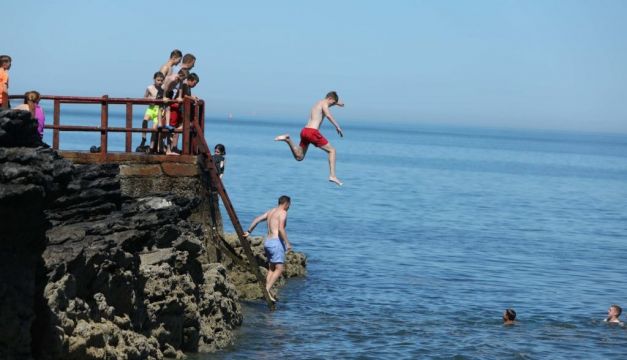Forecasters are warning that Ireland's highest-ever August temperature could be recorded over the next few days.
Sunny days and balmy nights are predicted with Met Éireann indicating that Ireland could reach a higher temperature than the 31.5 degrees recorded at Oak Park in Co Carlow on August 2nd, 1995.
Met Éireann senior forecaster Gerry Murphy said a status yellow high temperature warning is in place for the Republic this weekend.
"Temperatures did get over 30 degrees [on Thursday]. And we can expect those temperatures to go possibly higher today and certainly higher in few places tomorrow," he said.
"It is quite possible that we could reach that August [temperature] record hit in 1995."
⚠️UPDATED - High Temperature warning ⚠️
We have updated our warning for the weekend.
Impacts:
• Heat stress, especially for the more vulnerable
• High Solar UV index
• Risk of water related incidents
For full details see⬇️https://t.co/Xg3aMJlyuShttps://t.co/iILCy6JlwU pic.twitter.com/iEwQh4zHTQAdvertisement— Met Éireann (@MetEireann) August 12, 2022
Mr Murphy predicted a change on Sunday with slightly lower temperatures. However, he said it still looked like it would be "quite hot."
"As we go through Sunday afternoon and Sunday evening we will see showers breaking out across the country. And some of those could be quite heavy. Temperatures will drop back then on Monday to the low 20s. And then on Tuesday to the high teens and low 20s. So we will see much more average weather."
Cathal Nolan, a climate scientist and weather analyst at Univeristy College Cork, told Newstalk radio that this year was unusual in that there were two hot spells when temperatures exceeded 30 degrees.
"It is pretty rare in an Irish sense and looking at the temperatures today it is likely we will breach the 30-degree barrier again. The all-time August record is potentially at risk," he said.
"We experienced 33.1 degrees already this year in Phoenix Park, which was the highest temperature recorded in 100 years in Ireland. It is likely over the next couple of years we will see the all-time record being broken. That does seem to be on the cards."
Mr Nolan said climate change will also cause Ireland to experience wetter winters.
"We are likely to see drier summers. But the flip side is that we are expecting to see an increase in terms of winter precipitation."
Heading to the coast to cool off? Stay safe during this #Heatwave
Temperatures may be soaring, but the water is still cold. If you get into trouble in the water, #FloatToLive. Lean back, using your arms and legs to stay afloat. Then call for help or swim to safety. pic.twitter.com/pYWxCL8KB0— RNLI (@RNLI) August 11, 2022
Meanwhile the RNLI has urged people to safely enjoy the water this weekend and to go to bathing spots which have lifeguards.
Kevin Rahill from the RNLI told Newstalk that a lifeguarded beach was the best place to swim because of the extra supervision.
"There are a number of things people can do to ensure that they stay safe. One is ideally try to swim within your depth. If things do go wrong you can stand up and walk out. Rips are very common on beaches," he said.
He added that cold water shock can still occur despite the high temperatures.
"You can suffer from cold water shock at any time. You can have cold water shock in the Mediterranean or anywhere. It is about the relative difference between the body temperature and the water temperature.
"Cold water shock can take place in water temperatures below 15 degrees. Even in the summer if we get to 15 or 16 degrees that is the maximum water temperature around Ireland. Cold water shock is a realistic thing in Ireland."







